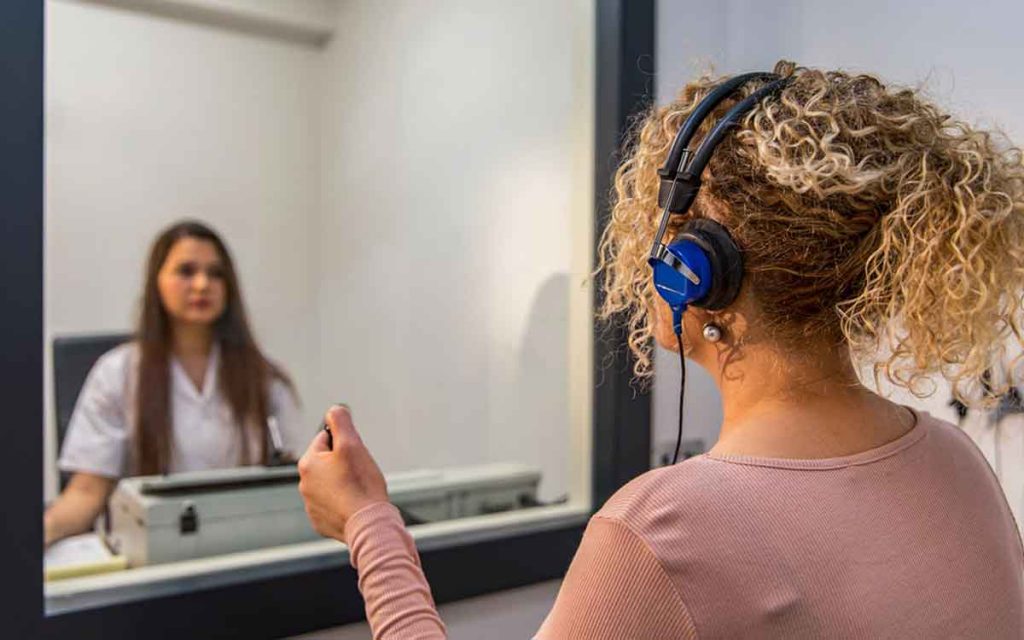When should you get a hearing test? Here are four signs you need to get your hearing checked.
The other day, my kids complained about how loud my television was. Do you know what I said to them? I said, “What?!” It was funny. Because it was a joke. But it also wasn’t. The TV has been getting louder and louder. And I started to wonder: should I get a hearing test?
There aren’t all that many reasons not to schedule yourself for a hearing test. They’re not invasive, there’s no radiation, you don’t have to worry about discomfort. It’s really just that I haven’t made time for it.
Considering how much untreated hearing loss can affect my health, I really should be more vigilant about making sure my hearing loss hasn’t gotten worse. Because when my hearing changes, I need to have my hearing aids adjusted to counter that.
Hearing assessments are important for a wide variety of reasons. It’s often difficult for you to discover the earliest signs of hearing loss without one, and even mild hearing loss can affect your health.
So when should you get a hearing test? Here are some signs that it’s time.
Signs you should get a hearing test
If you’ve recently experienced any of the signs of a hearing loss, it’s probably a good idea to get a professional hearing screening. Obviously, if things are difficult to hear, that’s a pretty strong indication of hearing loss.
But that’s not the only symptom, and there are some signs of hearing loss that are much less obvious:
- It’s hard to hear in noisy venues: Have you ever been to a crowded or noisy room and had difficulty following the conversation because of all the ambient noise? That could actually be a sign of hearing loss. Being able to isolate sounds is one indication of a healthy ear; this ability tends to wane as hearing loss progresses.
- It sounds like everyone’s mumbling all the time: Sometimes it’s not loss of volume you need to worry about, it’s a loss of definition. One of the earlier signs of hearing loss is difficulty following conversations. If you notice this happening more and more, you might want to schedule a hearing test.
- You’re always missing text messages: Your phone (or mobile device, as they’re called these days) is designed to be loud. So if you’re constantly missing calls or text messages, it might be because you aren’t hearing them. And maybe, when you think about it, you’re missing out on more everyday sounds.
- Ringing that won’t go away: Ringing in your ears, which goes by the name of tinnitus, is often a sign of hearing damage. If you’re experiencing some ringing that won’t stop, it might or might not be a sign of hearing loss. But it’s definitely an indication that you should get a hearing test.
Here are a few other situations that indicate you should schedule a hearing screening:
- Your ear hasn’t cleared after an infection
- You have a buildup of ear wax you can’t clear on your own
- You take certain medications that can harm your hearing
- It is difficult to pinpoint the source of sounds
- You have vertigo
This list is by no means exhaustive. There are other examples of red flags (if, for example, the volume on your TV is maxed out and you still wish it could go just a little bit louder). But any one of these signs is worth following up on.
Regular checkups
But what if, to your knowledge, you haven’t experienced any of these possible signs of hearing loss? Is there a guideline for how often you should go get your hearing checked? (There’s a guideline for everything else, right, so there’s got to be a guideline for this.) Well, yes, there are recommendations.
- Get a baseline test done sometime after you’re 21. That way, you’ll have a baseline of your mature hearing.
- If your hearing is normal, undergo hearing screenings or tests every three years or so. That can be a huge chunk of time to pay attention to, so make sure they’re marked in your medical records somewhere.
- If you show signs of hearing loss, you will want to get it checked immediately, and then annually after that.
Regular screenings can help you detect hearing loss before any red flags appear. The earlier you seek treatment, the better you’ll be able to preserve your hearing in the long run. Which means, you should probably turn your TV down and schedule a hearing test.
